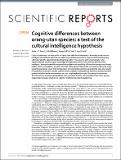Files in this item
Cognitive differences between orang-utan species: a test of the cultural intelligence hypothesis
Item metadata
| dc.contributor.author | Forss, Sofia I. F. | |
| dc.contributor.author | Willems, Erik | |
| dc.contributor.author | Call, Josep | |
| dc.contributor.author | van Schaik, Carel P. | |
| dc.date.accessioned | 2016-08-15T12:30:14Z | |
| dc.date.available | 2016-08-15T12:30:14Z | |
| dc.date.issued | 2016-07-28 | |
| dc.identifier | 245028670 | |
| dc.identifier | 200a4451-0d3d-42b3-99d2-b5b44e605809 | |
| dc.identifier | 84979924778 | |
| dc.identifier | 000380974700001 | |
| dc.identifier.citation | Forss , S I F , Willems , E , Call , J & van Schaik , C P 2016 , ' Cognitive differences between orang-utan species: a test of the cultural intelligence hypothesis ' , Scientific Reports , vol. 6 , 30516 . https://doi.org/10.1038/srep30516 | en |
| dc.identifier.issn | 2045-2322 | |
| dc.identifier.other | ORCID: /0000-0002-8597-8336/work/37478028 | |
| dc.identifier.uri | https://hdl.handle.net/10023/9302 | |
| dc.description | We also express our gratitude to the following foundations who have financially supported this project: A. H. Schultz Foundation, Paul Schiller Foundation and the Claraz Foundation in Switzerland and Waldemar von Frenckells Foundation, Ella and Georgh Ehrnrooths Foundation, Otto A. Malms Donationsfond, Nordenskiöld Samfundet and Oskar Öflunds Foundation in Finland. | en |
| dc.description.abstract | Cultural species can-or even prefer to-learn their skills from conspecifics. According to the cultural intelligence hypothesis, selection on underlying mechanisms not only improves this social learning ability but also the asocial (individual) learning ability. Thus, species with systematically richer opportunities to socially acquire knowledge and skills should over time evolve to become more intelligent. We experimentally compared the problem-solving ability of Sumatran orang-utans (Pongo abelii), which are sociable in the wild, with that of the closely related, but more solitary Bornean orang-utans (P. pygmaeus), under the homogeneous environmental conditions provided by zoos. Our results revealed that Sumatrans showed superior innate problem-solving skills to Borneans, and also showed greater inhibition and a more cautious and less rough exploration style. This pattern is consistent with the cultural intelligence hypothesis, which predicts that the more sociable of two sister species experienced stronger selection on cognitive mechanisms underlying learning. | |
| dc.format.extent | 12 | |
| dc.format.extent | 848606 | |
| dc.language.iso | eng | |
| dc.relation.ispartof | Scientific Reports | en |
| dc.subject | BF Psychology | en |
| dc.subject | General | en |
| dc.subject | NDAS | en |
| dc.subject.lcc | BF | en |
| dc.title | Cognitive differences between orang-utan species: a test of the cultural intelligence hypothesis | en |
| dc.type | Journal article | en |
| dc.contributor.institution | University of St Andrews. School of Psychology and Neuroscience | en |
| dc.contributor.institution | University of St Andrews. Centre for Social Learning & Cognitive Evolution | en |
| dc.identifier.doi | https://doi.org/10.1038/srep30516 | |
| dc.description.status | Peer reviewed | en |
| dc.identifier.url | http://www.nature.com/article-assets/npg/srep/2016/160728/srep30516/extref/srep30516-s1.pdf | en |
| dc.identifier.url | http://www.scopus.com/inward/record.url?scp=84979924778&partnerID=8YFLogxK | en |
This item appears in the following Collection(s)
Items in the St Andrews Research Repository are protected by copyright, with all rights reserved, unless otherwise indicated.

